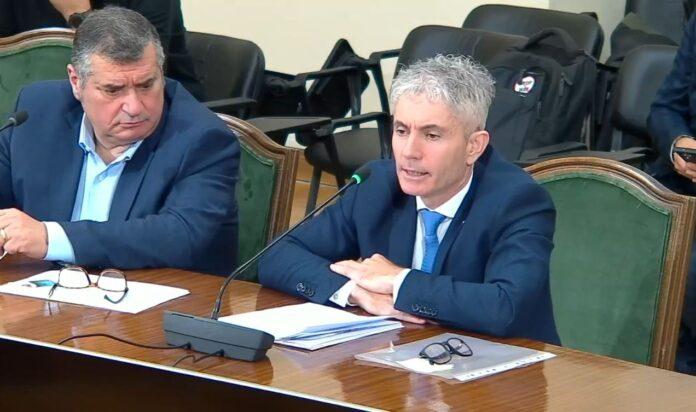Biznesmeni Ilir Rrapaj, i cili është në burg për koncesion 100 mln euro të sterilizimit, po dëshmon në Komisionin Hetimor në Shëndetësi.
Ai është shprehur se nuk ka një diplomë, pasi ka ndërprerë studimet në vitin e katërt. Ai gjithashtu ka deklaruar nuk i kujtohet kapitali me të cilin ka krijuar kompaninë e tij në Itali.
“Kam studiuar në Shqipëri, studimet i kam ndërprerë në vitin e katërt. Nuk jam diplomuar. Para se të bëhesha pjesë e koncesionit të Sterilizimit kam ushtruar një aktivitet të sipërmarrjes në Itali. Kam patur një sipërmarrje me aktivitet imobiliar dhe shërbime ndërtimore. Kompaninë e kisha vetëm, por më vonë e kam përditësuar në vite me persona të tjerë. Nuk më kujtohet kapitali me të cilin e kam krijuar. Padyshim është në respekt të ligjeve të shtetit italian”, tha Rrapaj.
Prej tre vitesh SPAK ka nisur një hetim në lidhje me koncesion e sterilizimit. Ilir Rrapaj ishte një biznesmen i panjohur në qarqet e biznesit në Shqipëri deri në vitin 2013. Para se socialistët të vinin në pushtet, ai ishte pronari i një agjencie ndërmjetësimi si edhe i një kompanie modeste ndërtimi me qendër në Peruxhia të Italisë.
Një kompani që rezultonte të kishte vetëm një të punësuar në Itali, teksa arriti të fitonte në Shqipëri një tender kaq të lakmuar prej rreth 100 milion dollarësh.
Por çfarë është kontrata e sterilizimit?
Ajo është një prej katër projekteve të PPP nne mbështetje buxhetore në shëndetësi që e ka zanafillën në mandatin e parë qeverisës të kryeministrit Edi Rama. Kontrata u firmos në vitin 2015 mes ish-ministrit të Shëndetësisë, Ilir Beqja dhe kompanisë koncesionare SaniService –aksionerët e së cilës janë Investital LLC dhe kompanitë italiane “Servizi Italia”, “Tecnosanimed” dhe “U.Jet S.r.l”.
Paketën më të madhe të aksioneve në këtë koncesion e zotëron Investital LLC- një kompani e vogël e themeluar me kapital 1 mijë euro në Kosovë nga Ilir Rrapaj. Sipas të dhënave të publikuar nga BIRN pak kohë më parë rezulton se Rrapaj u kthye në Shqipëri pas zgjedhjeve të vitit 2013 dhe para se të fitonte koncesionin, vendosi kontakte të shpeshta me ish-ministrin e Shëndetësisë, Ilir Beqaj.
Elektrobisturia është pjesë e njërit prej seteve kirurgjikale, që kompania koncesionare “SaniService” i shet Ministrisë së Shëndetësisë për çmime që variojnë nga 16 mijë lekë deri në 45 mijë lekë (me TVSH) për çdo ndërhyrje.
Kontrata e Partneritetit Publik Privat për sterilizimin e instrumenteve kirurgjikale është në vitin e shtatë të operimit, dhe ka shënuar rritje të ndjeshme të kostove të parashikuara.
Anëtarët e komisionit që përgatiti studimin e fizibilitetit për koncesionin e sterilizimit i thanë Prokurorisë se qendra nuk ishte vënë në punë prej tetë vitesh për shkak të mungesës së stafit të trajnuar. Ata e përdorën atë si një argument më shumë se pse shërbimi duhej dhënë me koncesion.
Rrapaj fiton koncesionin 100 milion euro të sterilizimit
Për më shumë se një dekadë, Ilir Rrapaj drejtoi një kompani të vogël ndërtimi me vetëm një të punësuar, të regjistruar në një zonë të qetë rezidenciale në qytetin e Peruxhias të rajonit Umbria në Itali, të cilën e themeloi së bashku me dy të afërm të tij në vitin 2000 me një kapital të vogël prej 1500 eurosh.
Megjithatë, pas fitores së Partisë Socialiste në zgjedhjet e qershorit 2013, emigranti me origjinë nga fshati Rexhepaj i Vlorës u kthye në Shqipëri dhe vendosi kontakte me kreun e shëndetësisë shqiptare, Ilir Beqaj, me të cilin ka pasur takime të shpeshta ku kanë marrë pjesë edhe biznesmenë italianë, të interesuar në tregun e shërbimeve mjekësore.
Dy vjet pas rikthimit në atdhe, me anë të një kompanie të regjistruar në Kosovë, Rrapaj është shpallur fituesi kryesor i një kontrate koncesionare prej 100 milionë dollarësh në një tender të kontestuar.
Nëpërmjet kompanisë së tij Investital LLC, e cila ka një kapital prej 1000 eurosh dhe është e regjistruar në Prishtinë, Rrapaj zotëron 40 % të aksioneve të një bashkimi kompanish italiane, të cilat fituan tenderin për sterilizimin e pajisjeve kirurgjikale.
Ortakët e Rrapajt në konsorcium janë tre kompani nga rajoni i Umbrias, përfshirë “Servizi Italia”, e cila ka një eksperiencë 35-40 vjeçare në fushën e sterilizimit dhe mbetjeve spitalore, “Tecnosanimed” dhe “U.Jet S.r.l”.
Konkurrent në tender kanë qenë gjithashtu një grup tjetër operatorësh ekonomikë Italianë si:”S.S.I”, “Mario Gugliemo” dhe “Brema Ambiente”, të përfaqësuar nga kompania “Action Laundery” me qendër në Durrës.
Konsorciumi humbës pretendon që shpallja fitues e konsorciumit në të cilin Rrapaj ka shumicën e aksioneve është e paligjshme, pasi ai ka dhënë një ofertë që tejkalon fondin limit. Ajo e ka ankimuar vendimin e Komision të Vlerësimit të Ofertave, KVO të Ministrisë së Shëndetësisë në Komisionin e Prokurimit Publik, KPP.
KPP-ja ka kërkuar rivlerësimin e vendimit fillestar të KVO-së, por kjo e fundit ka marrë një vendim të dytë, duke e shpallur përsëri grupin e kompanive ku përfshihet Investital LLC si fitues.
Të dhënat e mbledhura nga BIRN sugjerojnë se konsorciumi i emigrantit shqiptar, Ilir Rrapaj ka pasur kontakte të vazhdueshme me ministrinë e shëndetësisë dhe ministrin Beqaj që nga viti 2013.
Mbetet e paqartë se çfarë roli luan kompania Invetital Ll.C në konsorcium, duke qenë që ka vetëm 1 të punësuar, kapital minimal dhe në dukje zero eksperiencë në fushën e mjekësisë.
I pyetur nëpërmjet telefonit për marrëdhënien e tij me Ilir Rrapajn, ministri Beqaj në fillim mohoi ta njihte. Pasi BIRN i dërgoi ministrit disa fotografi ku ai shfaqej me biznesmenin nga Peruxhia, Beqajt iu rifreskuar memoria, duke pranuar se “kishte njohje me z.Ilir Rrapaj.”
“Pas interesimit tuaj, nga hulumtimi i dokumentacionit lidhur me koncesionin me objekt ‘Për shërbime të integruara për ofrimin e setit të personalizuar të instrumenteve kirurgjikale…’, rezulton se z. Ilir Rrapaj është përfaqësues i një prej kompanive, pjesëtare të një prej konsorciumeve ose Operatorëve Ekonomikë (OE) që kanë paraqitur interes për këtë procedurë prokurimi,” u shpreh Beqaj.
Ndërkohë Ministria e Shëndetësisë mohon që oferta e konsorciumit ku përfshihet Rrapaj të jetë mbi fondin limit të tenderit duke i cilësuar akuzat si “shpifje.”
Rrapaj nga ana tjetër refuzoi t’i komentonte kontaktet e tij me ministrin Beqaj, duke u mjaftuar me pretendimin se procedura e dhënies së koncesionit kishte qenë sipas tij e suksesshme.






